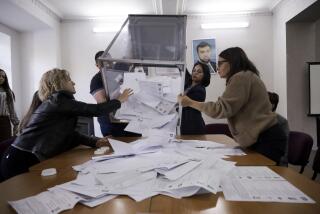Yeltsin Wins Key Point in Battling Legislators : Government: Local and regional elections will be required in Russia. But he gets to set the date.
- Share via
MOSCOW — Russian Federation President Boris N. Yeltsin won half a victory in his battle to bring the entire government bureaucracy of the vast republic under his control when lawmakers on Thursday backed away from their demand for full local and regional elections in December.
After nearly two weeks of quarreling, the Russian Supreme Soviet voted, 156 to 16, for a compromise that requires the election of local officials but allows Yeltsin to set the date for the elections.
This will permit him to continue appointing for some time his own men to run the regional governments--many the size of U.S. states--and even municipal administrations. It is power that he says he needs to push through his reforms over opposition from entrenched Communist Party bureaucrats.
Without such all-encompassing authority, Yeltsin maintained that he could not overcome the current political paralysis. Elections would only complicate the reform process, his supporters contended, and Russians’ patience with politics is near an end. “We will have a tidal wave of strikes that will bury everyone and the country itself,” a deputy from the Siberian coal fields declared.
The legislature had earlier insisted on immediate elections, despite Yeltsin’s warnings that conservatives would win in many areas. Yeltsin, angered by this unprecedented defiance, vetoed the bill. Ruslan Khasbulatov, the Supreme Soviet’s acting chairman, spent a week working out the compromise.
Andrei Golovin, a leader of the liberal Smena bloc in the legislature, said its members had supported the proposed Dec. 8 elections because the regional and local governments were not promoting reform and that popular elections, not presidential appointments, were the proper way to effect change. “If we don’t hold prompt elections to local organs of power, we won’t survive, because those organs of power are not functioning,” Golovin explained at a press conference.
But Vyacheslav Volkov, co-chairman of the Democratic Russia bloc, said the election issue was more complex. “The president is trying to put through radical economic reform and not distract people with the latest elections. I think the position of the president is the more persuasive one.”
Although Yeltsin eventually won this test of strength, mostly through insisting on loyalty from the deputies, the battle was a bruising reminder that he must still develop his massive popularity into organized political support.
“By voting again for the same law, you will reject the presidential veto and thus make a highly confrontational gesture,” Sergei B. Stankevich, a top Yeltsin adviser, told the deputies. “Your decision is a test of your readiness for political cooperation with the president on the eve of this crucial period.”
The face-off tested both Yeltsin’s political strength and the ability of the Russian Federation’s emerging governmental system to resolve such disputes, especially when they involve fundamental issues.
“For the first time in our country, the legislature is not in agreement with the executive branch,” Mikhail Chelnokov, leader of the Radical Democrats, commented. “That’s an absolutely normal, natural, civilized situation. There has only been so much noise about it . . . because it is the first time.”
Yeltsin is likely to encounter further opposition next week when the Russian Congress of People’s Deputies, the federation’s parliament, convenes to debate sweeping constitutional changes, as well as the program of economic reforms that the president is expected to present.
But deputies said the divisions within the Congress are such that the very election of a chairman could again lead to a stalemate. Representatives of the major parliamentary blocs said the constitutional changes are so complex that they could not possibly be passed quickly.
Yeltsin will probably get the support he needs for economic reforms, even the planned freeing of prices over the next two months, although some deputies said they want to see Yeltsin’s whole program before agreeing to the price increases.
But Yeltsin is facing a proliferation of challenges to his authority at the regional level.
On Thursday, the regional council in Kaliningrad introduced legislation that would effectively proclaim its independence from the Russian government and declare its laws and officials supreme on its territory. A Russian enclave on the coast of the Baltic Sea, Kaliningrad is separated from the rest of the country by the now independent Lithuania.
In the Chechen-Ingush region, preparations went ahead for presidential and parliamentary elections in a “republic” that local secessionists have proclaimed in rebellion against continued Russian rule. Yeltsin appointed a “presidential representative” to administer the area on Thursday, and the Russian Supreme Soviet declared the elections illegal and the results void in advance.
Times staff writer Carey Goldberg and Viktor K. Grebenshikov, a reporter in The Times’ Moscow Bureau, contributed to this story.
More to Read
Sign up for Essential California
The most important California stories and recommendations in your inbox every morning.
You may occasionally receive promotional content from the Los Angeles Times.












